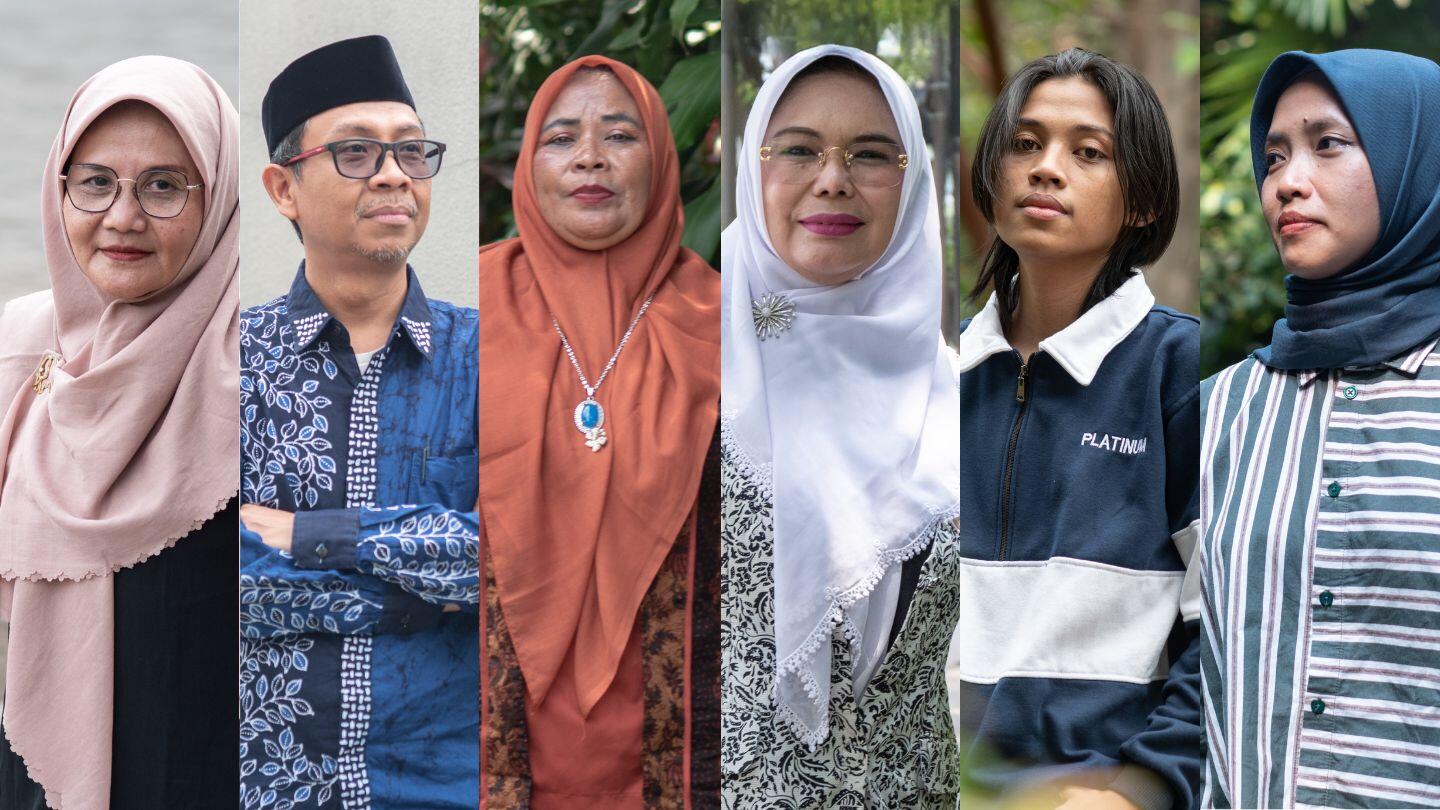Female Genital Mutilation/Cutting (FGM/C) in Indonesia remains a deeply rooted cultural practice despite growing awareness of its harmful effects. Traditionally justified by misconceptions surrounding hygiene, morality, and religious obligation, FGM/C continues to be performed in many communities, often on newborn babies. According to the 2024 Indonesian National Women's Life Experience Survey (Survei Pengalaman Hidup Perempuan Nasional/SPHPN), 46.3% of Indonesian women aged 15-49 have undergone FGM/C. Each percentage point represents a life altered, a future dimmed by a practice rooted in misconception, not compassion.
But amidst this daunting reality, a powerful movement is rising. Individuals, driven by compassion and a fierce commitment to change, are stepping forward to rewrite the narrative. They're not just challenging a practice; they're reclaiming dignity, restoring hope, and building a future where every girl is born free.
This article, made possible through the generous support of the UNFPA-UNICEF global programme to end FGM and the Government of Australia through the '“Breaking the silence: Increasing accountability on addressing Female Genital Mutilation in Southeast Asia” programme, brings together the voices of those leading the fight against FGM/C in Indonesia—each with their own journey, struggles, and triumphs. These are the people working tirelessly to ensure that no girl has to endure this harmful practice.
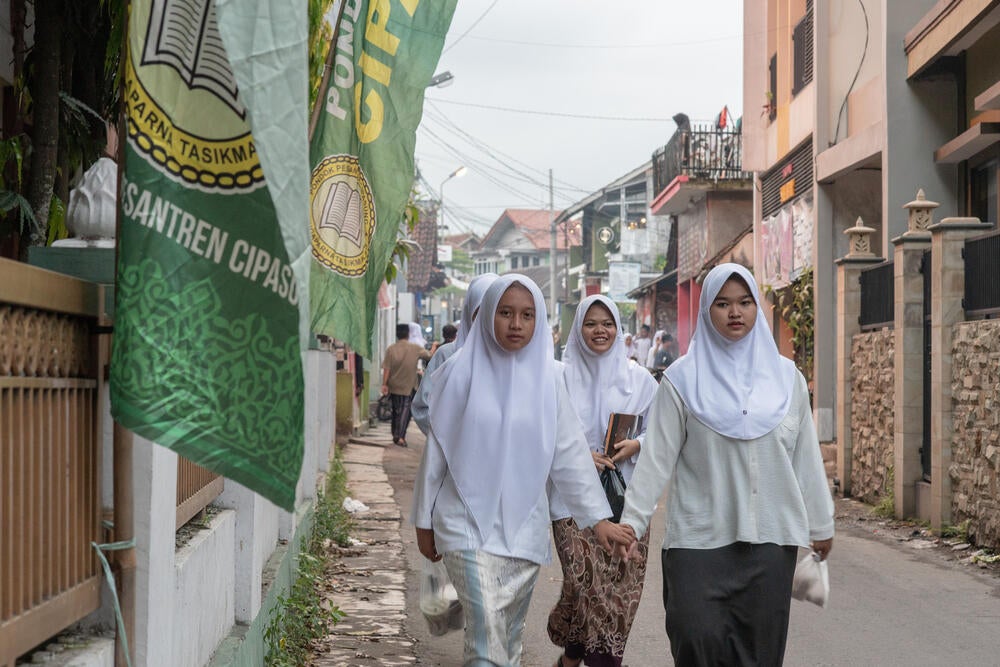
(Photo: UNFPA/Eka Nickmatulhuda)
A Legacy Transformed: Heti Maryati’s Journey from Paraji to Midwife
“Thank God, they listened. They said they would follow my advice,”
In a quiet village in Tasikmalaya, West Java, Heti Maryati grew up in a family of traditional birth attendants (paraji), inheriting the role from her mother, Mak Onah. The practice of FGM/C, known locally as female circumcision, was a deeply rooted tradition. "My mother always said, ‘If you circumcise, make sure there’s no blood,’" Heti recalls.
Although she never found the so-called ‘mataholang’ (clitoral glans)—the small, rice-sized white part believed to be removed—she continued symbolic practices involving ritual cleaning and prayer for more than 20 years.
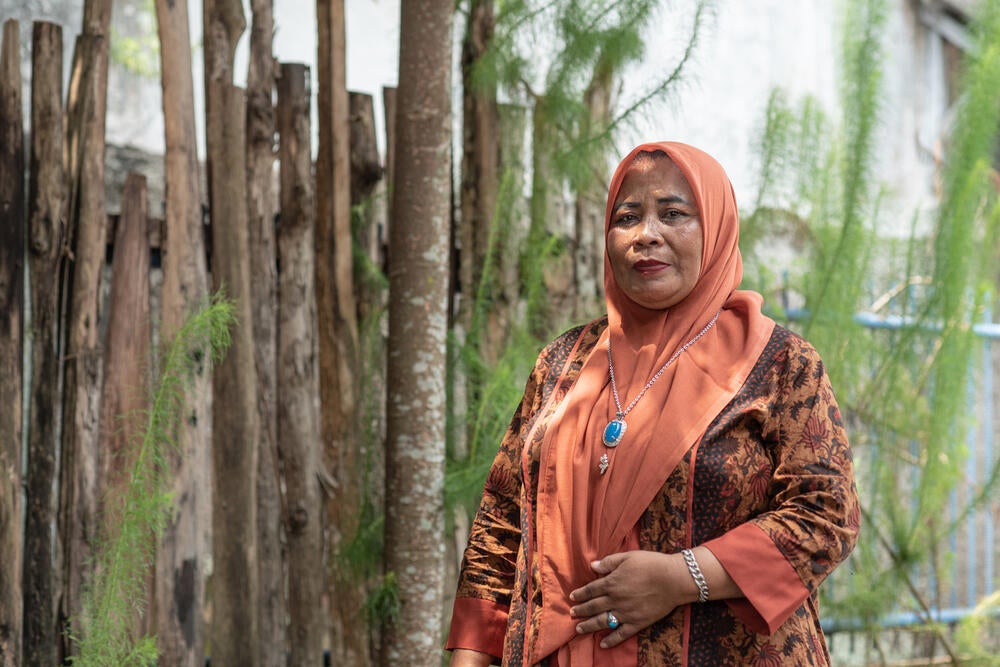
(Photo: UNFPA/Eka Nickmatulhuda)
Over time, exposure to medical training and health regulations changed her perspective. She finally decided to pursue midwifery education, during which she began to understand the risks of infection, pain, and long-term complications associated with FGM/C. "The more I learned, the more I questioned why we were doing this at all," she says.
Now a certified midwife, Heti actively educates parents on the dangers of FGM/C. After attending many FGM/C awareness sessions, Heti began to refuse requests for circumcision. “It’s pointless," she says. She also began educating parents about FGM/C, explaining its impacts and dangers. “Thank God, they listened. They said they would follow my advice,” she explains. She also spreads awareness through local health initiatives, ensuring that new generations are protected from this harmful practice.
Heti's journey from being a paraji to becoming a midwife advocating against FGM/C is a story of profound transformation. Hands that once performed rituals of the harmful tradition now gently cradle newborns, ensuring their safety and well-being. Her voice, once hushed by custom, now rings with the clarity of informed advocacy. She embodies the power of knowledge to dismantle harmful practices.
Faith and Awareness: Neng Ida’s Advocacy through Religious Circles
"There’s no clear religious requirement for FGM/C. If it causes harm, it should be abandoned,"
As a religious educator in Tasikmalaya, Neng Ida Nurhalida has long observed how traditions and religious interpretations shape perceptions of FGM/C. "Many believe it prevents immorality," she says. However, through her work with Islamic boarding schools (pesantren) communities and Muslim women’s groups, she challenges this misconception by presenting alternative religious perspectives.

By referencing fatwas from the Indonesian Women Ulama Congress (Kongres Ulama Perempuan Indonesia/KUPI) and Al-Azhar University in Egypt, she dismantles the belief that FGM/C is an Islamic obligation. "There’s no clear religious requirement for FGM/C. If it causes harm, it should be abandoned," she argues.
Her approach is careful and strategic. She introduces these ideas subtly during religious discussions, ensuring that the message is well-received by conservative audiences. "Faith should protect, not harm," she emphasizes.
A Survivor Speaks: Nurasiah Jamil’s Mission in Health Education
“Anyone can advocate for this cause. You don’t need to be a survivor to take action, but you can learn from the experiences of those who have endured it,"
For Nurasiah Jamil, a lecturer in midwifery and an advocate against FGM/C, the issue is deeply personal. "I was circumcised as a child, and I suffered infections for years," she recalls. Only after studying reproductive health and gender did she recognize the potential long-term effects of the procedure, including sexual health issues.
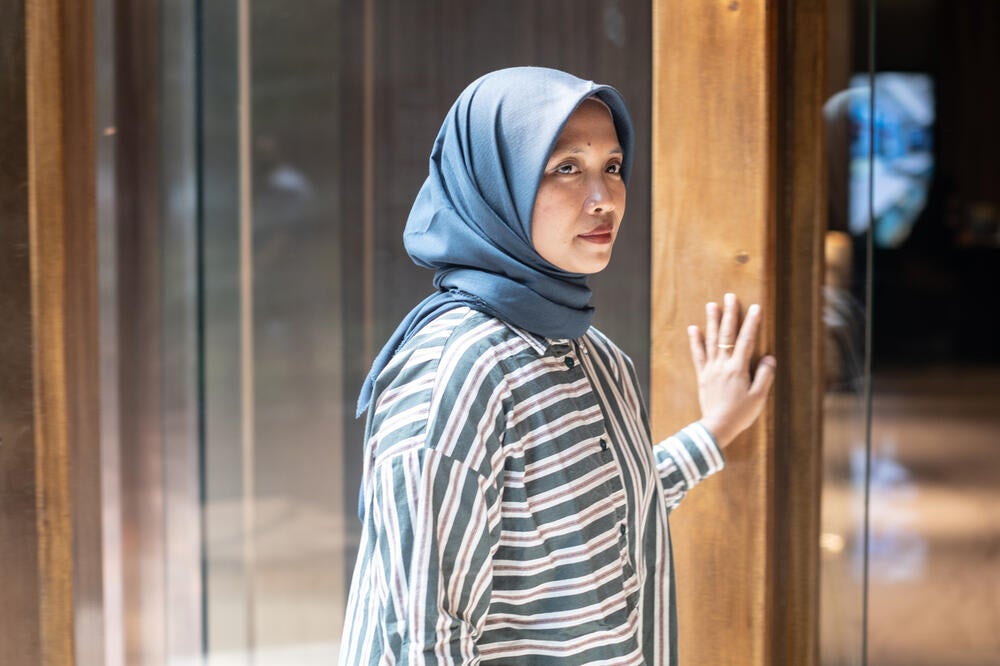
When she became a mother, she was pressured to circumcise her own daughter, but she firmly refused. "No one could give me a medical reason, only tradition," she says. Her experience reinforced her commitment to educating the next generation of midwives.
“Anyone can advocate for this cause. You don’t need to be a survivor to take action, but you can learn from the experiences of those who have endured it," she affirms. "Let’s ensure this is not done to our daughters in the future because FGM/C undermines the dignity of women,” she concludes passionately.
Now, she ensures that her students understand the medical and psychological consequences of FGM/C. By integrating gender-sensitive education into health curricula, she fosters a new generation of health professionals who reject the practice and advocate for change.
Institutional Change: Ade Jubaedah’s Stance Against FGM/C
"Even just touching the area with antiseptic to appease parents is legitimizing the practice. We need full commitment to stop it."
As the Chairperson of the Indonesian Midwives Association (IBI), Ade Jubaedah has witnessed shifting policies on FGM/C. While early government regulations attempted to control the practice through medicalization, more recent policies, including the 2022 KUPI statement and updated health regulations, have reinforced its prohibition.
In early 2024, under her leadership, IBI issued an official circular letter (surat edaran) banning midwives from performing any form of FGM/C, including symbolic practices. The letter was followed by educational efforts in 10 provinces where FGM/C prevalence is highest, such as West Java, South Kalimantan, Banten, Jambi, Bangka Belitung, and West Sulawesi.
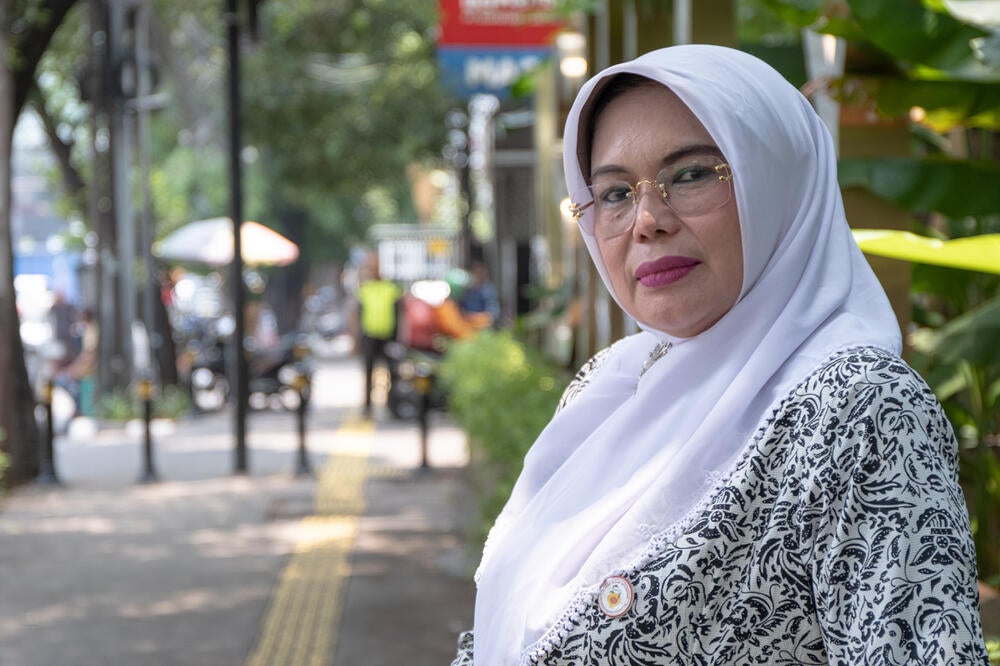
"We now firmly advise all midwives to refuse performing FGM/C," she states. However, challenges remain, particularly in convincing religious leaders and communities that even symbolic circumcision is still a form of harm. "Even just touching the area with antiseptic to appease parents is legitimizing the practice. We need full commitment to stop it."
Despite IBI's firm stance, some religious leaders still argue that if a community considers the practice sacred, it should be allowed. This divide creates tension for midwives, who often face pressure from families to perform FGM/C, even symbolically. "Midwives need protection from the government because many perform symbolic circumcision under social pressure," Ade emphasizes.
Her work includes training midwives, engaging in policy advocacy, and pushing for stronger regulations that explicitly protect girls. "We’re making progress, but it requires persistence," she affirms.
Faith and Human Rights: Faqihuddin Abdul Kodir’s Religious Perspective
"Islam is about protection and compassion. If a practice causes harm, it is our duty to abandon it,"
As a scholar and member of the KUPI council, Faqihuddin Abdul Kodir has worked to bridge Islamic teachings and human rights. "There is no theological basis for FGM/C," he asserts. "It stems from cultural control over women’s bodies, not religious obligation."
His work emphasizes a compassionate approach, advocating for interpretations that prioritize health, dignity, and equality. Through his research and outreach, he works with religious leaders to shift mindsets and clarify misconceptions.
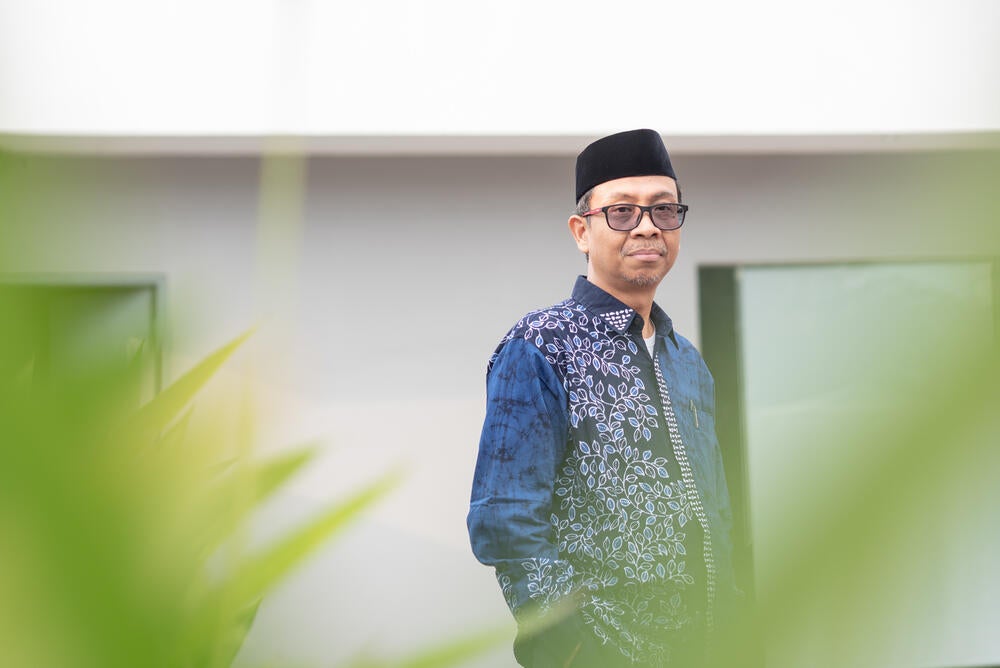
"Islam is about protection and compassion. If a practice causes harm, it is our duty to abandon it," he explains. His efforts are instrumental in shaping religious discourse around FGM/C in Indonesia.
Faqihuddin's voice is a beacon of clarity, illuminating the path toward a compassionate interpretation of Islam. His work is a testament to the power of dialogue, of bridging divides to create a more just and equitable world.
Youth Mobilization: Ridho and the Role of Young Activists
"This isn’t just a women’s issue; it’s a human rights issue,"
In the digital age, youth voices are instrumental in driving change. Ridho, a young activist from the Bogor District Children’s Forum (Forum Anak Kabupaten Bogor), uses social media and grassroots discussions to educate peers. "Many of my friends didn’t even know FGM/C was still happening," he says. "Once they understand, they become part of the movement to end it."

By integrating the issue into community forums and policy discussions, Ridho ensures that future generations recognize FGM/C as a violation of rights, not a cultural norm. He also encourages young men to take part in the conversation. "This isn’t just a women’s issue; it’s a human rights issue," he emphasizes.
His activism includes workshops, content creation, and policy recommendations. "We have the power to change mindsets and traditions. It starts with awareness and education," he says.
The Path Forward: A Unified Effort
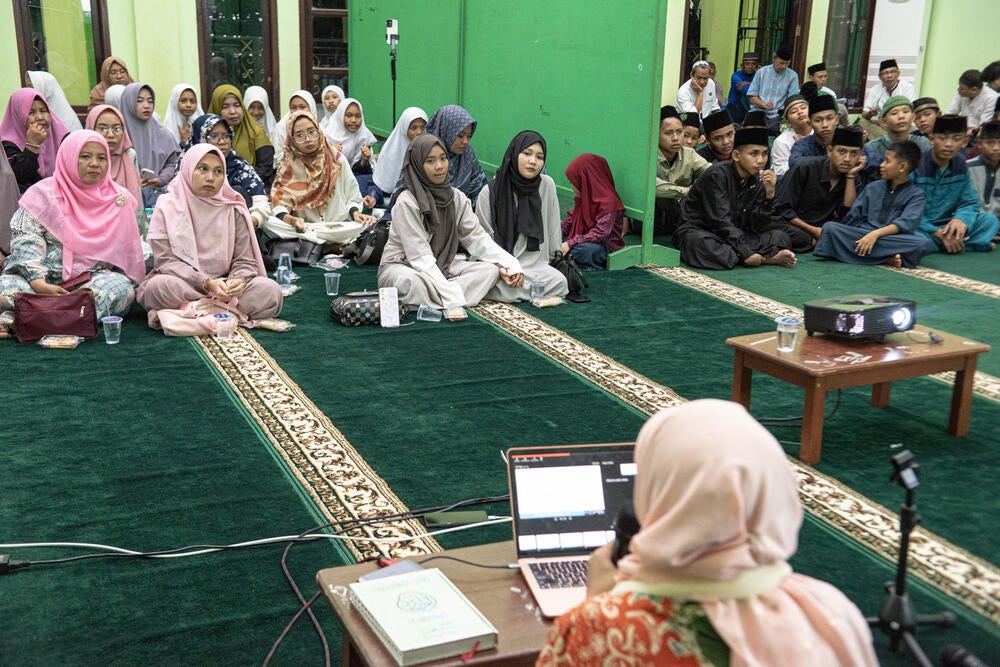
Indonesia is at a turning point. With nearly half of women aged 15-49 having undergone FGM/C, the fight against this harmful practice is more urgent than ever. The voices in this article—midwives, religious leaders, educators, and young activists—are pushing back against centuries-old beliefs, proving that change is possible.
Ending FGM/C requires persistence, courage, and collective action. It starts with conversations in homes, community centers, schools, and health clinics. It continues with stronger policies, community-led education, and the unwavering belief that every girl deserves the right to grow up free from harm.
This movement is not just about rejecting an old practice; it’s about building a future where tradition aligns with dignity, where faith is a source of protection, and where no girl is forced to endure what so many before her have.
Itsnain G. Bagus
Communications Associate, UNFPA Indonesia
Interviews by Eka Nickmatulhuda

